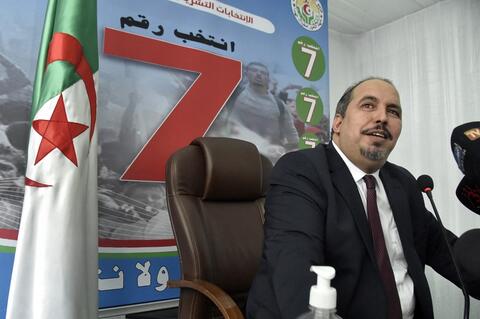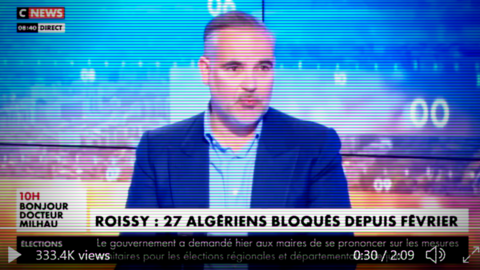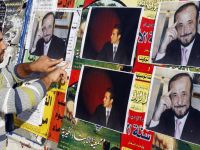Algerian President Abdelmadjid Tebboune’s announcement of the appointment of a technocratic prime minister deepened the disappointment of Islamists who were eager to win an active role in the government or even monopolise the executive power.
His moves gave the impression that the make-up of the new government would be very far from fulfilling the ambitions of the Muslim Brotherhood’s sympathisers.
BREAKING: Algeria's president names Finance Minister Ayman Benabderrahmane as prime minister, asks him to form new government
— The New Arab (@The_NewArab) June 30, 2021
The appointment of the former minister of finance, Ayman Benabderrahmane, as prime minister and his assignment to continue consultations with the political parties and the bloc of independents, so as to form the new cabinet, reinforced the fears of the largest Islamist party in the country, the Society for Peace Movement (Hams), that political spoils would not materialise.
To pre-empt developments, the party made the surprise announcement that it was abstaining from participation in the new government.
Abderrazak Makri, Hams’s top man, said the Brotherhood was not impressed by the offer made to them by Tebboune, during the meeting he held with them as part of political consultations between the presidency and the winning parties after the recent legislative elections.
Makri’s reaction reflected the shock of the movement, which aspired to play a major role in the government formation and implementation of its programme.
The head of the Society for Peace Movement said that “the offer received by the party to enter the government does not allow us to influence the political and economic policies as we had pledged to the voters”.
Islamists were hoping to lead the new political scene, despite taking third place in terms of parliamentary seats.
The head of Hams justified the party Shura Council’s decision to abstain from entering the government, Wednesday, by saying, “Tebboune reminded us that whoever wants to be in the government must adhere to the 54-point programme that he had presented to voters. We suggested to the president a way to address this issue by integrating the president’s programme with ours, but we did not find anyone with whom to continue the dialogue on the subject of the programme.”
He pointed out that the presidency asked Hams to send a list of 27 names from which four or five would be picked to hold ministerial positions in the new government. This, he said, suggested that nothing had changed in the status quo that prevailed before the February 2019 Hirak movement.
Makri was alluding to the absence of any real change in the exercise of power, especially with regard to dealing with political parties.
However, he did not conceal the movement’s previous ambition to play a more consequential role in the new political scene by saying, “Hamas aspired to participate in power and not in the government.”
He was referring to the Brotherhood’s desire to expand its presence in the various official institutions and bodies of the state and not just to continue to perform a limited role in the government.
He mentioned in this regard the influence wielded by the National Liberation Front in various institutions through the appointment of its members as ambassadors, governors and into various government positions.
Tebboune seems to have deluded the Islamists by telling foreign media that authorities were not worried by the rise of Islamists, as he said that, “Islamists in Algeria comply with the laws of the republic and do not carry an ideological project as it exists in some Arab and Islamic countries.”
Algeria's president asks Ayman Benabderrahmane to form a new government as prime minister at a time the OPEC country is under financial pressure because of lower oil and gas revenues https://t.co/83ZtWED5rJ
— TRT World (@trtworld) June 30, 2021
Algeria watchers say that this statement gave Islamists the impression that the authorities needed them. But eventually only a limited offer was made to them reminding them of their true political size.
Even the expected presence of the second faction of the Brotherhood (the National Building Movement) in the government will not change anything.
After blaming the failure to achieve the parliamentary majority on election fraud (without accusing Tebboune), Makri criticised the popular Hirak movement, especially the opposition political parties, which he accused of “serving narrow and ideological partisan purposes, which enabled the gang and the remnants of the gang (the pockets of the Bouteflika regime), to co-opt the Hirak movement and change its essence.”.
Analysts say that Makri, who pre-empted Taboune’s surprising move by announcing non-participation in the government, wanted to maintain bridges with the Algerian street through what he called “Hams’s performance of the opposition role within parliament, and working to establish a national political consensus, open a comprehensive dialogue and seek appeasement measures.”
But analysts believe that this role could have been coordinated with the authorities, given that the new parliament was almost entirely dominated by loyalists, a situation that called for the presence of an opposition to convince public opinion of the existence of a democratic system.
Makri expressed his movement’s adherence to “defending freedoms, the right to establish parties, national unity and the continuation of the search for national consensus,” a discourse that was absent from the Hams narrative until the last election campaign.
This article has been adapted from its original source.


![Algerian President Abdelmadjid Tebboune on January 21, 2020 [KRAMDI/AFP via Getty Images] Algerian President assigns Ayman Benabderrahmane as prime minister.](/sites/default/files/styles/d06_standard/public/2021-07/GettyImages-1195130706.jpg?h=10d202d3&itok=UFbWCLxp)






